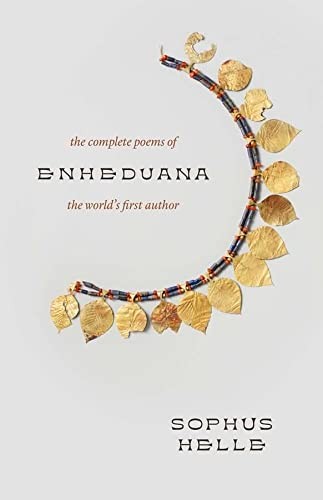288 pages
English language
Published July 8, 2023 by Yale University Press.

288 pages
English language
Published July 8, 2023 by Yale University Press.
In Enheduana: The Complete Poems of The World’s First Author, Sophus Helle provides Anglophone readers access to the Sumerian author Enheduana’s arresting poems, which embody bursts of momentum and delight. In the first long poem, “The Exaltation of Inana,” praise and desire are translated through lyrical beauty into words such as stone and storm, as well as wear, with, and wind.
Enheduana was a high priestess and royal princess who lived in Ur, in what is now southern Iraq, about 2300 BCE. Not only does Enheduana have the distinction of being the first author whose name we know, but the poems attributed to her are hymns of great power. They are a rare flash of the female voice in the often male-dominated ancient world, treating themes that are as relevant today as they were four thousand years ago: exile, social disruption, the power of storytelling, gender-bending identities, the devastation …
In Enheduana: The Complete Poems of The World’s First Author, Sophus Helle provides Anglophone readers access to the Sumerian author Enheduana’s arresting poems, which embody bursts of momentum and delight. In the first long poem, “The Exaltation of Inana,” praise and desire are translated through lyrical beauty into words such as stone and storm, as well as wear, with, and wind.
Enheduana was a high priestess and royal princess who lived in Ur, in what is now southern Iraq, about 2300 BCE. Not only does Enheduana have the distinction of being the first author whose name we know, but the poems attributed to her are hymns of great power. They are a rare flash of the female voice in the often male-dominated ancient world, treating themes that are as relevant today as they were four thousand years ago: exile, social disruption, the power of storytelling, gender-bending identities, the devastation of war, and the terrifying forces of nature.
This book is the first complete translation of her poems from the original Sumerian. Sophus Helle’s translations replicate the intensity and imagery of the original hymns—literary time bombs that have lain buried for millennia. In addition to his translations, Helle provides background on the historical context in which Enheduana’s poems were composed and circulated, the works’ literary structure and themes, and their reception in both the ancient and the modern world.
Unjustly forgotten for millennia, Enheduana’s poems are essential reading for anyone interested in the literary history of women, religion, the environment, gender, motherhood, authorship, and empire.